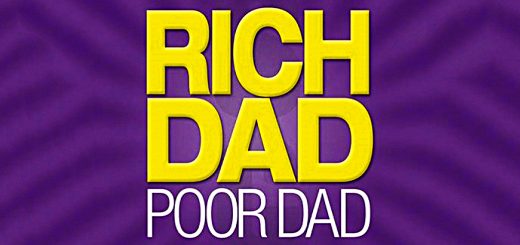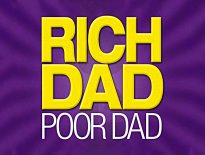Rich Dad Poor Dad 3 – Work, Obstacles and Checklists

Today’s post is our third visit to Robert Kiyosaki’s Rich Dad Poor Dad.
Work to Learn
Chapter 6 of Robert’s book is called work to learn.
- The subtitle is “don’t work for money”.
The chapter begins with a story about how Robert told a young journalist (and wannabee novelist) to go to sales school and switch her day job to advertising.
- For Robert, everything is about sales and marketing.
In terms of the easiest route to success, he may have a point.
- In terms of self-actualisation, sales fall short for a lot of us.
Robert puts this down to a fear of rejection, but I think that some people only want to be involved in the creation of a product or service, and not in its sale or delivery.
I have a lot more time for the central message of the chapter – that you should work at different things to learn a bit about them.
Rich dad encouraged Mike and me to know a little about a lot. He encouraged us to work with people smarter than we were and to bring smart people together to work as a team.
The idea is that you pick up the skills you will need later in your career before you become too trapped in the rat race.
Apart from sales and marketing, Robert rates a few other business skills:
- other communications skills (writing, speaking, negotiation)
- cash flow management
- operational systems
- managing people
- time management
Overcoming obstacles
Chapter 7 is about overcoming obstacles.
There are five main reasons why financially literate people may still not develop abundant asset columns that could produce a large cash flow.
- Fear
- Cynicism
- Laziness
- Bad habits
- Arrogance
Fear manifests as a fear of losing money, and therefore of taking an appropriate level of risk.
- Winners are inspired by failure, whereas losers are afraid of it.
On the other hand, Robert favours focus over diversification, at least during the “get rich” phase.
- So perhaps we would disagree about what constitutes an appropriate level of risk.
Robert seems to equate cynicism with self-doubt, whereas for me it’s more about questioning the motives of others.
- He also includes nay-sayers and doom-mongers under this section, but I’m pretty sure they aren’t cynics either.
One thing we do agree on is that to succeed financially, you need to Cut Out The Noise.
- And you certainly shouldn’t let your criticisms of a less than perfect world – or a less than perfect investment opportunity – prevent you from taking any action at all.
What Robert means by laziness is a form of stressing over the small stuff -keeping busy with little things as a way of avoiding dealing with the big problems.
- Some people keep busy with work (( Or even a blog )) others play golf, watch TV or even go shopping,
Robert’s solution to laziness is greed.
- He suggests that we replace “I can’t afford it” with “How can I afford it?”
So financial independence (retirement from the Rat Race) becomes “How can I afford to never work again?”
Or as Eleanor Roosevelt said:
Do what you feel in your heart to be right – for you’ll be criticized anyway. You’ll be damned if you do, and damned if you don’t.
On habits, the only one that Robert mentions specifically is that you learn to Pay Yourself First (save money every month).
Robert seels arrogance as a mask for ignorance – a pretence that we know all we need to make money, and that what we don’t know isn’t important.
I see this a lot in relatively experienced investors, who stick with the first method that brought them success, regardless of how the best practice has moved on since then.
- Of course, they wouldn’t see it as arrogance – they might even frame it as the humility of knowing better to attempt strategies that are beyond them.
Investing is a life-long journey, and you need to regularly expose yourself to new approaches and new sources of information.
- Eighty to ninety per cent of your time will be wasted, but that’s true of almost everything in life.
Getting started
Robert starts chapter 8 in bullish fashion:
To find million-dollar “deals of a lifetime” requires us to call on our financial genius. I believe that each of us has a financial genius within us.
In real estate, I can go out and in a day come up with four or five great potential deals, while the average person will go out and find nothing, even looking in the same neighborhood. The reason is that they have not taken the time to develop their financial genius.
Our culture has educated us into believing that the love of money is the root of all evil.The message is still to work hard, earn money, and spend it, and when we run short, we can always borrow more.
To counter this, Robert has a 10-step program:
- use the power of spirit – a purpose
- make daily choices
- mostly about not spending, and saving up to buy first education and then assets instead
- choose your friends carefully
- Robert is particularly interested in rich friends who might have information that points you towards the next boom, so you can get out again before the bust
- learn quickly – you become what you study
- put another way, be careful what you learn
- but always search for a “faster formula”
- Pay yourself first – use the power of self-discipline
- Robert says this step is the hardest to master if its not part of your character.
- And that its the number one factor in who gets to be rich (see the marshmallow test for more on this).
- To help with this, keep debts and expenses low, and build up assets.
- Pay well for good advice
- I must admit that I struggle with this one, having received almost no good advice in my life.
- I’m not counting people like plumbers and locksmiths here, and I had a pretty good divorce lawyer.
- These days, you rarely get to speak to a real expert but have to deal with salespeople instead.
- In my experience, it has been far better to read a few books and learn to Do It Yourself.
- Focus on return on investment, and the duration of the asset (how soon you get your capital back).
- Robert actually expands on this to say that he is always looking for something thrown in for free.
- I think this approach is easier to apply in the real estate arena.
- Don’t buy luxuries on credit.
- Put another way, Don’t Keep Up With The Joneses.
- Choose your heroes carefully.
- Robert chooses Buffett and Soros, Peter Lynch, and interestingly, Donald Trump (with whom he’s written a couple of books).
- Teach in order to give back, and to learn more yourself.
- Robert actually takes this further and says that you should first give what are in need of, and then “it will come back in buckets”.
I’m not sure I could get on very well with quite a few things on that list.
- But your mileage may vary.
To-dos
Robert is aware that the 10-step program is somewhat philosophical in nature, so alongside it, he has a more practical action list which he calls his “to dos”:
- Stop what you are doing.
- Take a break to assess what is working and what is not.
- Look for new ideas (in books).
- Find someone who has done what you want to do.
- Take classes and attend seminars.
- Make lots of (low) offers (on real estate).
- Note that Robert includes get out clauses involving the disapproval of an unspecified business partner (his cat).
- Think big.
- Action always beats inaction.
Final thoughts
The key to financial freedom and great wealth is a person’s ability to convert earned income into passive and/or portfolio income.
With each dollar bill that enters your hand, you, and only you have the power to determine your destiny. Spend it foolishly, and you choose to be poor.
Spend it on liabilities, and you join the middle class. Invest it in your mind and learn how to acquire assets, and you will be choosing wealth as your goal and your future.
Conclusions
That’s it – we’ve reached the end of the book.
- It’s been a little disappointing today, with a lot more focus on the self-help side of things and a lot less about investment.
I’ll be back in a couple of weeks with a summary of the three articles so far.
- Until next time.














